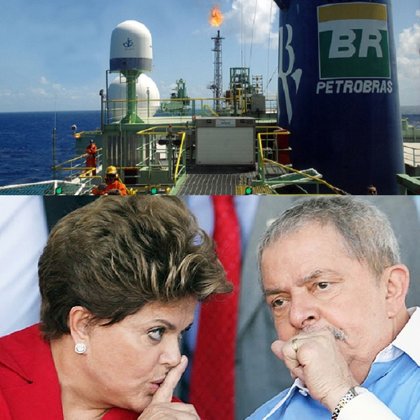THE BIGGEST BRAZIL'S CORRUPTION SCANDAL IN HISTORY OVER OIL GIANT PETROBRAS .BRAZIL'S SENATE VOTED TO OUST FORMER PRESIDENT DILMA ROUSSEFF FROM PRESIDENCY.FORMER PRESIDENT LUIZ INACIO LULA DA SILVA'S PRISON SENTENCE TO 12 YEAR.
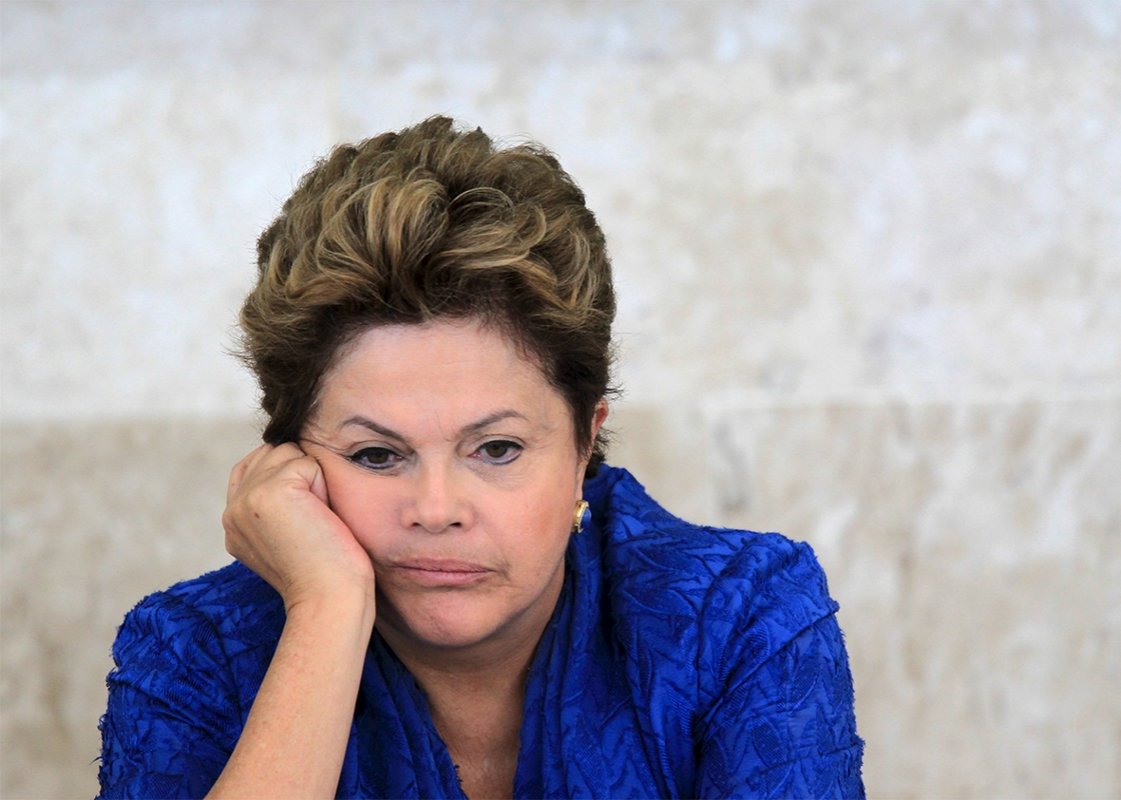 Dilma Rousseff impeached by Brazil’s Senate in historic vote.Impeachment should require indisputable evidence of the commission of a crime by the president. As is clear from the wording of the Constitution, impeachable offenses are serious and are committed intentionally against legal interests directly linked to the structure of the Constitution and, consequently, the Brazilian state. The applicable law does not include budgetary accounting errors or funding shortfalls as impeachable crimes.
Dilma Rousseff impeached by Brazil’s Senate in historic vote.Impeachment should require indisputable evidence of the commission of a crime by the president. As is clear from the wording of the Constitution, impeachable offenses are serious and are committed intentionally against legal interests directly linked to the structure of the Constitution and, consequently, the Brazilian state. The applicable law does not include budgetary accounting errors or funding shortfalls as impeachable crimes.
Two former presidents - close allies Dilma Rousseff and Luiz Inacio Lula da Silva - have found themselves under investigation since 2014.Brazil's state-run oil company, Petrobras, has released its financial results , which include $2bn written off due to corruption.The firm has been embroiled in huge cash for contracts scandal which has had far reaching political and economic consequences.On the face of it, it is a straightforward corruption scandal - albeit one involving millions of dollars in kickbacks and more than 80 politicians and members of the business elite.But as the tentacles of the investigation dubbed Operation Car Wash fanned out, other scandals emerged.It has led to some of those who have found themselves accused claiming they are the victims of political plots, designed to bar them from office.But what is this scandal all about? And who is it said to involve?The oil company Petrobras, in Angra dos Reis, Rio de Janeiro, Brazil. Founded in 1944, Odebrecht's relationship with politicians dates back to the 1950s, when the board of state-run oil giant Petrobras was made of military staff from the state of Bahia, where the constructor held its headquarters for decades.Odebrecht began its cozy relationship with politicians in the 1950s, when the board of state-run oil company Petrobras was comprised of military personnel from Bahia state, where Odebrecht had its headquarters for decades. Campos said that during Brazil's military rule in 1964-1985, the company focused lobbying efforts on executives and government agencies. Much money was spent to gain government favor, and the practice was considered a good investment.In 1992, police interrogated Emilio Odebrecht about alleged bribes worth $3.2 million paid to the campaign treasurer of then President Fernando Collor de Mello. At the time, the company's then-CEO said the payments were for consulting work, although there was no evidence to support that.A year later, Odebrecht was linked to corruption after dozens of floppy discs were seized at the home of top company executive Manoel Ailton Soares dos Reis. One recovered document named more than 350 politicians who received money from the company. Reis, who never faced charges, told a congressional commission that the hundreds of names on the discs were "personal and subjective impressions to guide internal criteria for possible and future campaign collaborations."As Brazilians say when investigations don't bear fruit, "it all ended in a pizza."Shortly before the 1994 presidential election, Emilio Odebrecht acknowledged paying bribes amid a series of scandals.Initially, the company was able to deflect blame to Petrobras, where the probe began and with which Odebrecht had worked for decades. But over the last few years, federal Judge Sergio Moro, who is overseeing the probe, has ordered the arrest of top company executives including former CEO Marcelo Odebrecht, Emilio's son, along with politicians allegedly bribed by the company.Investigations have revealed the extreme measures Odebrecht allegedly employed to pay off politicians, including one scheme involving a major brewery.The beer at Itaipava brewery was regularly sent through pipes to a volume-measuring meter that authorities used to calculate taxes. Former Odebrecht executive Olivio Rodrigues described how pipes were refashioned to bypass the meter, creating a way to collect money for paying off politicians. The construction company and the brewery made $73 million with the scheme in 2008 alone. Itaipava has denied any wrongdoing.With its future now uncertain, Odebrecht says it has fired those involved in past bribery and is offering anti-corruption courses to its workers.In a letter sent to employees last week, Odebrecht's board said "this negative phase" of the company was "necessary."
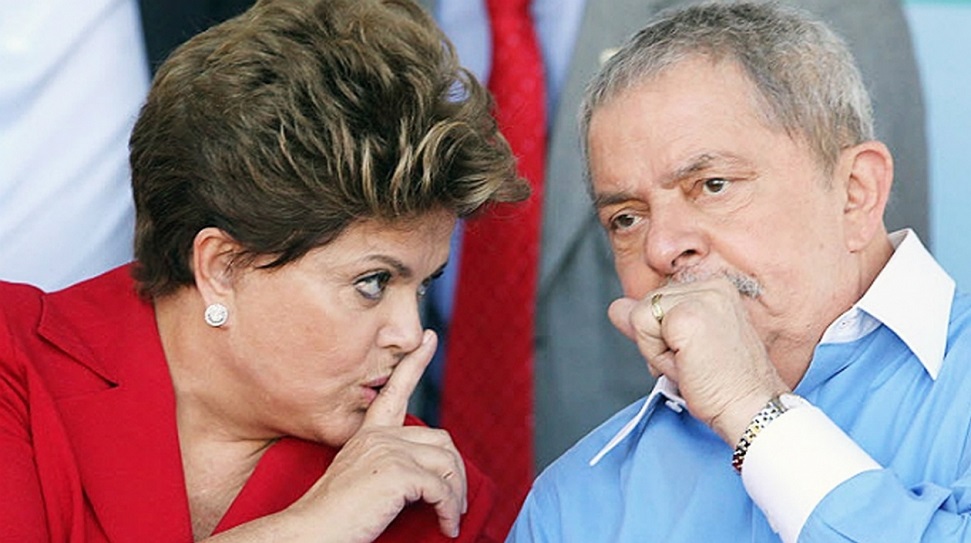 Former Brazilian president Dilma Rousseff,Two former presidents - close allies Dilma Rousseff and Luiz Inacio Lula da Silva - have found themselves under investigation since 2014.Top prosecutor Rodrigo Janot alleged that the Workers Party had received around $480 million in bribes to secure contracts of state-run oil company, Petrobras.
Former Brazilian president Dilma Rousseff,Two former presidents - close allies Dilma Rousseff and Luiz Inacio Lula da Silva - have found themselves under investigation since 2014.Top prosecutor Rodrigo Janot alleged that the Workers Party had received around $480 million in bribes to secure contracts of state-run oil company, Petrobras.
During the 2014 election campaign, Rousseff praised the work of the Federal Police, which has full autonomy in its investigations. “Swept under the carpet, corruption will stay hidden, until it is investigated,” stressed the president. “We always give extreme freedom to the Federal Police in all their investigations.”This freedom, once celebrated by the executive power, is currently tormenting the Labor Party.After nearly two years of Operation Car Wash, which is an investigation into corruption at the state-run oil company Petrobras, the Federal Police raided former president Luiz Inácio Lula da Silva’s home on Friday, March 4. The raid happened only a day after Senator Delcidio Amaral released a statement to the prosecutors tying Rousseff and Lula to the Petrobras scandal.The public prosecutors have said that Lula played a major role in the Petrobras scandal.“Ex-president Lula, besides being party leader, was the one ultimately responsible for the decision on who would be the directors at Petrobras and was one of the main beneficiaries of these crimes. There is evidence that the crimes enriched him and financed electoral campaigns and the treasury of his political group,” the pThe series begins ten years before the Lava Jato investigation with police investigating a money laundering scheme in the south of Brazil, eventually uncovering a larger bribery ring implicating politicians and businessman in the state-run oil company, which in the series is called Petrobrasil. As most quality shows do, The Mechanism sparked memes and tweets both positive and negative across social media. A valid criticism is that statements made in real-life by right-wing politicians were attributed to the leftist former president Luiz Inacio Lula da Silva in the show.Impeached former president Rousseff had particularly harsh words for the show’s producer, Jose Padilha, who she accused of smearing the leftist Workers’ Party (PT).rosecutors said in a statement.The Brazilian people have many questions regarding Lula’s involvement in the Petrobras corruption case. Eight other members of the Workers Party were also charged with corruption, cartel formation and money laundering.Lula da Silva was accused of heading the organisation that skimmed funds from Petrobras. The scheme had allegedly begun in 2002 after Lula da Silva won the election and continued till his successor Rousseff was impeached in 2016.Brazil top prosecutor Rodrigo Janot has alleged that the Workers Party had received around $480 million (more than Rs 3,081 crore) in bribes from Petrobras and the Brazilian National Development Bank. In a statement, the party said the charges made by Janot were baseless and were used to divert attention from other investigations. Lula was convicted of corruption for receiving a seaside property from a developer who was later awarded government contracts.A court upheld the conviction and raised Lula’s prison sentence to 12 years. The Supreme Court is to decide on his final appeal , after which the former president will likely begin serving his prison term. Despite the conviction, several other pending corruption charges, and the Workers’ Party (PT) involvement in the Petrobras and Odebrecht corruption scandals, Lula maintains widespread popularity across the country. Although he cannot officially participate in the presidential election due to his conviction, Lula continues to tour the country on campaign stops. Last week in the state of Santa Catarina.Former president Dilma Rousseff has denounced Lula’s conviction, accusing the opposition--the Brazilian Democratic Movement Party of attempting to discredit the left-leaning Workers’ Party, and push a neo-liberal agenda.That constitutional mechanism was the president's impeachment. It is a complex process that ultimately requires the support of two-thirds of the Senate. The process was followed diligently. However, it also requires the existence of a crime of responsibility, an unconstitutional act directly attributable to the president. The three jurists who presented the motion for impeachment – Janaína Paschoal, Miguel Reale Júnior and Hélio Bicudo – believe that they identified two such crimes.The first was a delay in repaying R$3.5 billion (roughly US$1 billion) to the Bank of Brazil for the financing of an agricultural program, constituting an illegal loan, or credit operation; the second was the signing, without congressional approval, of three supplementary credit decrees foreseeing R$2.33 billion (US$720 million) in new spending on education, culture, employment, social security, various executive organs and the judiciary, in violation of budgetary laws.The charge regarding the delayed repayments to the Bank of Brazil is null for two reasons. First and foremost, it is a stretch to assert that a delay of repayment constitutes a loan; indeed, there is no contract between the Treasury and the Bank of Brazil that would support this interpretation. Second, it is the Ministry of Finance and not the Presidency, that is responsible for credit operations.
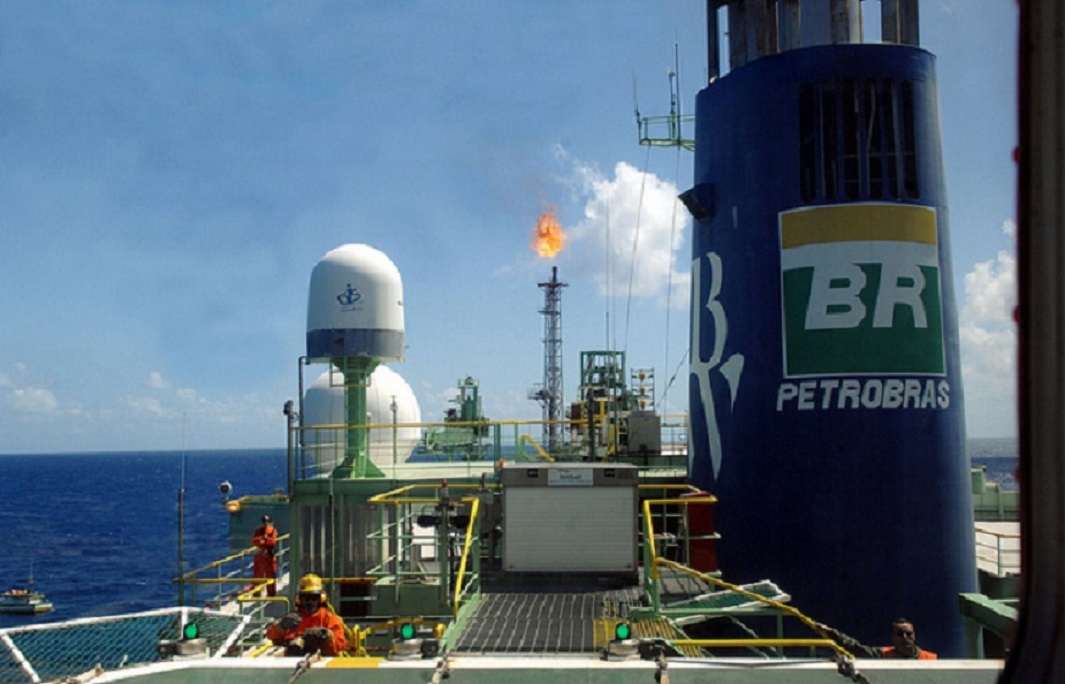
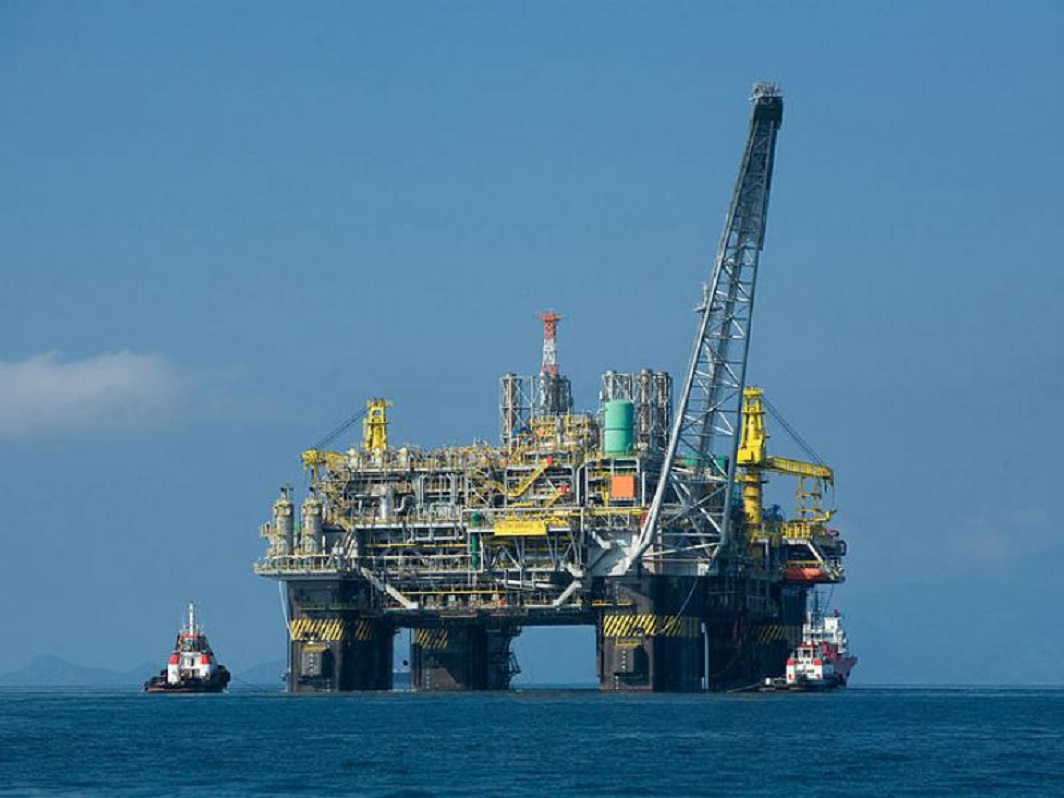 Petrobras is one of the world's leading oil companies and the largest company in Brazil. It is the dominant player in the Brazilian market, responsible for all hydrocarbon activities in the country, and is the third largest industrial company in Latin America with revenues close to US$100 billion.
Petrobras is one of the world's leading oil companies and the largest company in Brazil. It is the dominant player in the Brazilian market, responsible for all hydrocarbon activities in the country, and is the third largest industrial company in Latin America with revenues close to US$100 billion.
Brazil’s former president Luiz Inacio Lula da Silva was sentenced to nearly 12 years in prison for corruption and money laundering,The once adored politician who ruled Brazil from 2003 to 2010 was found guilty of accepting 3.7 million reais (US$ 1.2 million) worth in bribes from engineering firm OAS SA.Prosecutors said the company used that money to refurbish a beach apartment for Lula in return for his help winning contracts with state oil firm Petroleo Brasileiro.Lula is further accused of masterminding a large embezzlement and kickbacks scheme involving state-owned group Petrobras that is now at the center of a major corruption probe.The 71-year old politician, who is a top contender for next year’s presidential election has repeatedly denied taking bribes during or after his presidency. He has described the investigation against him as a campaign to prevent his return to power."This politically motivated judgment attacks Brazil's rule of law, democracy and Lula's basic human rights," Lula's defense team wrote in an email to Reuters. "It is of immense concern to the Brazilian people and to the international community."Dubbed “Operation Car Wash,” Brazil’s investigation into the Petrobras case that was initiated in 2014, has toppled several multinational companies and numerous Brazilian elites including Antonio Palocci, an influential minister in the governments of Lula and impeached Brazilian president Dilma Rousseff, who was sentenced to 12 years in prison for corruption .Lula, who was looking to make a political comeback and is free to run in next year’s presidential election until the legal process ends, will be barred from office if his guilty verdict is upheld by an appeals court, which is expected to take at least eight months to rule.This leaves the 2018 presidential race wide open and raises the possibility that one of many politicians ensnared in Brazil’s corruption investigations might win."Lula's absence opens a gaping hole in the political scene, it creates an enormous power vacuum on the left," Claudio Couto, a political scientist at the Getulio Vargas Foundation, told Reuters."We have now entered a situation of extreme political tension, even beyond the chaos we have been living for the last year.”Lula will remain free while an appeal is heard.The scandal has paralysed the government because bribes were essential for building coalitions. It has also choked business because prosecutors ordered the suspension of contracts between Petrobras and its major suppliers, which included almost all of the country’s biggest construction and shipping firms. In more than two years, 61% of Petrobras’ 276,000 employees have lost their jobs, according to local media. Many smaller firms that depended on its business have been made bankrupt.Many believe this pain will be worthwhile if the investigation leads to punishment of all corrupt politicians and sets the stage for a new era of clean government. But that future is a long way off, if it comes at all.Former Petrobras CEO Aldemir Bendine to jail for 11 years for taking US$1million in bribes from the Brazilian construction giant Odebrecht.Aldemir Berdin,What makes it worse is that Bendine was appointed as CEO in 2015 to clean up the company following its role in the major corruption scandal that involved both politicians and businessmen. Prior to his appointment to the Petrobras board, he led the state-owned bank, Banco do Brasil for six years.The case was presided by the famous Brazilian anti-corruption judge, Sergio Moro.Prosecutors had alleged that during his time as head of Banco do Brazil, Bendine orchestrated a $5million kickback for the rollover of a loan to Odebrecht. Later, Odebrecht refused to pay him, and once he was appointed to the Petrobras board, they gave him the $1million in exchange for unspecified favorable treatment from the company.
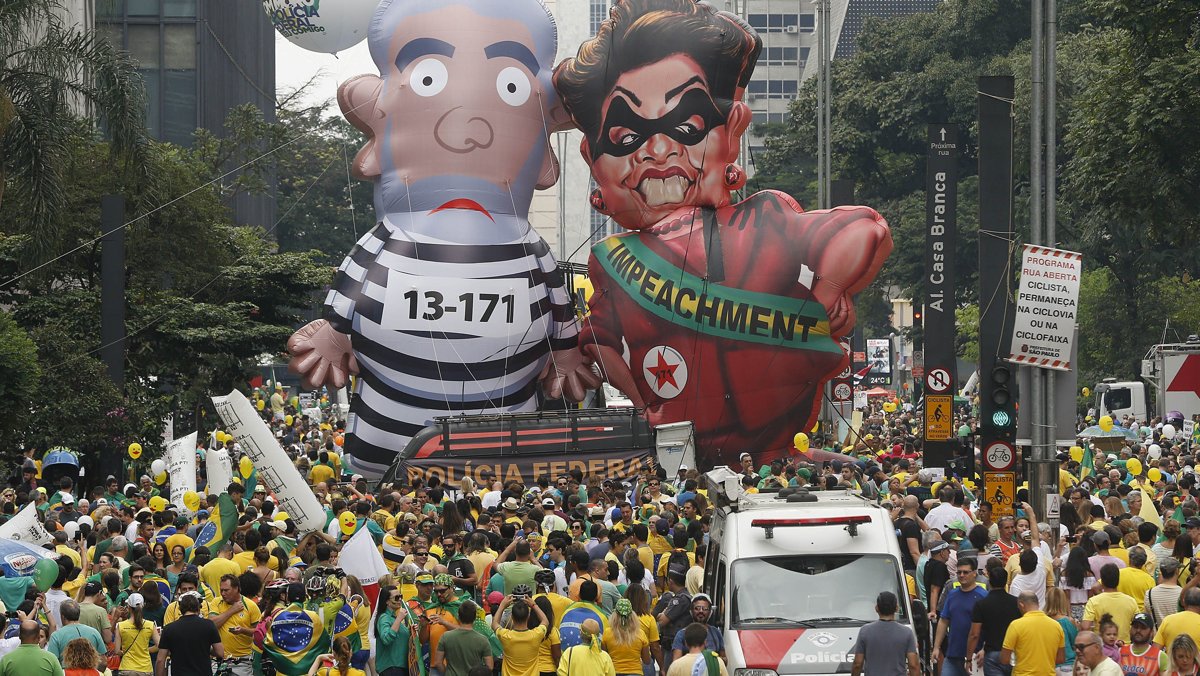
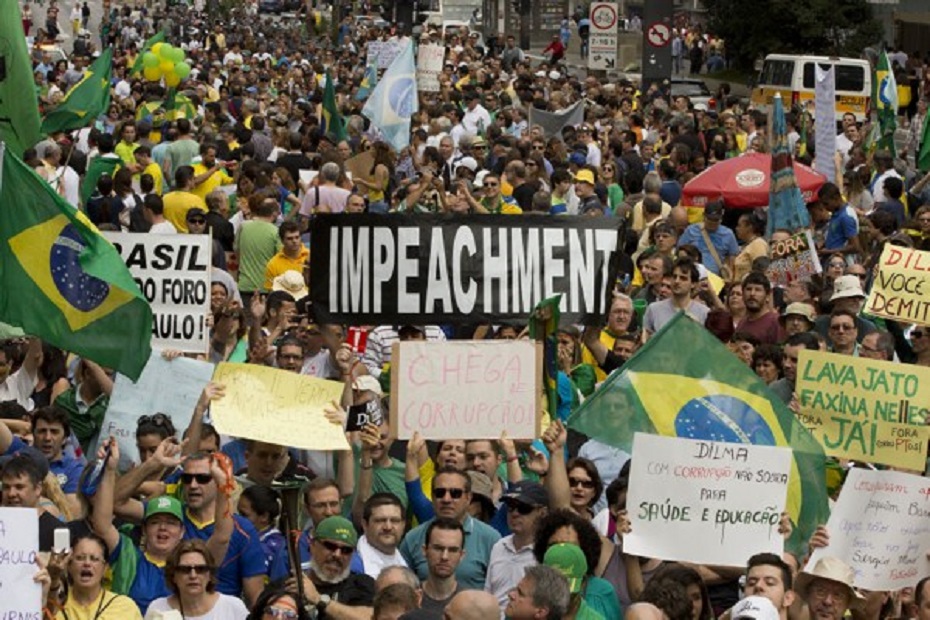
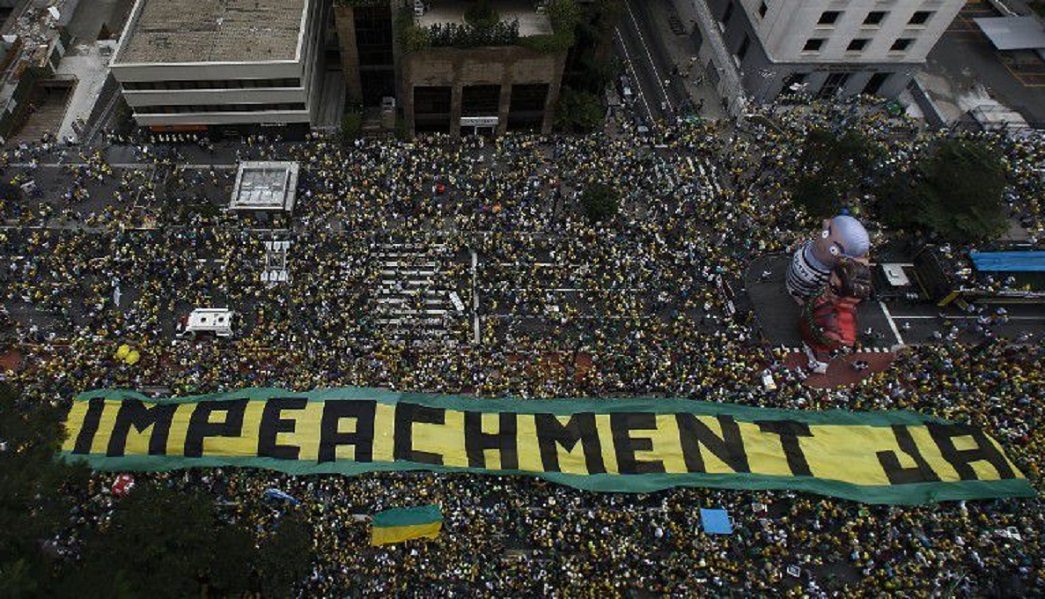 Protesters in Porto Alegre, southern Brazil, rally in against of the former president.Brazil’s Senate voted overwhelmingly to impeach President Dilma Rousseff in a historic decision that ends nearly 14 years of rule by her leftwing Workers’ party in Latin America’s largest country.
Protesters in Porto Alegre, southern Brazil, rally in against of the former president.Brazil’s Senate voted overwhelmingly to impeach President Dilma Rousseff in a historic decision that ends nearly 14 years of rule by her leftwing Workers’ party in Latin America’s largest country.
